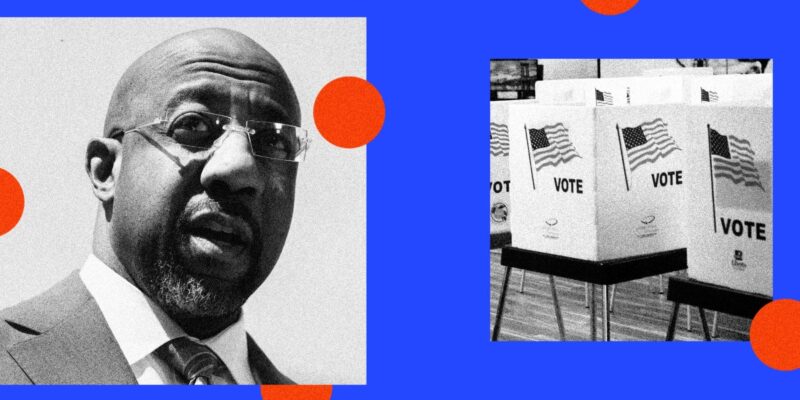
Since the 2020 election, GOP-controlled state legislatures have enshrined Donald Trump’s Big Lie by giving partisan actors unprecedented control over how elections are run and how votes are counted. According to the Voting Rights Lab, 29 states have passed 73 new laws impeding the administration of fair elections with efforts that include state legislatures seizing power over election responsibilities, firing local election officials, and imposing criminal penalties on them.
In an attempt to combat this escalating attack on American democracy, on Thursday Senator Raphael Warnock (D-Ga.) introduced the Preventing Election Subversion Act of 2023 with a group of Democratic senators. His co-sponsors include Rules Committee Chair Amy Klobuchar (D-Minn.) and Judiciary Committee Chair Dick Durbin (D-Ill.). The bill would “limit the arbitrary and unfounded removal of local election officials” and allow those who oversee federal elections to challenge their removal proceedings in federal court. It would also protect voters’ rights by restricting the ability of conservative activists to launch mass challenges to voter eligibility in states like Georgia.
“We have a basic premise in our system, one person, one vote,” Warnock told Mother Jones in an exclusive interview. “And my bill will ensure that we don’t have bad actors trying to undermine the voices of the people.”
The core provisions of the Election Subversion Act are also included in the Freedom to Vote Act, the sweeping package of pro-democracy reforms that Democrats in both chambers reintroduced earlier this month. The bill narrowly failed to pass in the last Congress, when Sens. Joe Manchin (D-W.Va.) and Kyrsten Sinema (I-Ariz.) sided with Senate Republicans to block it by making it impossible to exempt voting rights legislation from the filibuster. Warnock led the effort to pass that measure, but voting rights activists criticized President Joe Biden for not prioritizing it sooner or making more of an effort to convince recalcitrant Democrats to reform the filibuster. “Our failure to pass voting rights in this moment, when the democracy itself is under assault, is not only a public policy failure, in my view, it’s a moral failure,” Warnock said.
Democrats now have little hope of getting voting rights legislation through the GOP-controlled House of Representatives, where Republicans are instead pushing a bill that would enact strict curbs on voting access in Washington, DC, and nationalize barriers to the ballot box by implementing new voter ID laws, restricting mail-in voting, and banning private funding of election administration. House Administration Committee Chair Bryan Steil (R-Wis.) calls it “the most conservative election integrity bill to be seriously considered in the House in over 20 years.”
Despite these obstacles, Warnock said he would not give up the fight for voting rights. “I know that there are folks who are making the political calculation and saying, ‘Well, why are you doing this in this moment, Republicans control the House,’” he said. “Look, I will let the pundits do the punditry. I am here to protect the voices of ordinary people…Protecting our democracy is job one. And we will always hold every member of the United States Congress accountable when it comes to protecting our democracy. And so this is work that we cannot afford to turn our backs on.”
Warnock’s home state of Georgia is Exhibit A for how Republicans have tried to manipulate the election system to their advantage. In 2021, as part of a sweeping voter suppression bill (SB 202), the heavily gerrymandered state legislature removed Secretary of State Brad Raffensperger as the chair of the state election board after he defended the integrity of the 2020 election. It then gave itself the power to appoint a majority of the board’s members. The reconstituted state board, in turn, was handed the authority to take over up to four county election boards that it viewed as “underperforming,” raising fears that Republicans could hijack election operations in Democratic strongholds. Such power grabs have already occurred at the local level; in at least eight Georgia counties, Republicans have changed the composition of local election boards by ousting Democratic members and replacing them with GOP officials.
That’s not the only way fair election outcomes are under siege. Another provision of SB 202 explicitly allowed right-wing groups to challenge the eligibility of an unlimited number of voters. In 2022, according to ProPublica, six conservative activists challenged the eligibility of nearly 90,000 voters, leading to more than 10,000 voters being removed from the rolls. In an effort to prevent similar outcomes, Warnock’s bill would require that “any challenges to a voter’s eligibility to register to vote or cast a ballot, other than those submitted by an election official…be supported by personal knowledge with respect to each individual challenged.”
“There are partisan bad actors who are simply weaponizing this as a tool to create chaos in the system, and tying up resources,” Warnock said. “And these challenges are frivolous. They bog down the system, and it just shouldn’t be the case. Also, my bill will prevent partisan actors at the state level from simply being able to swoop in and take over local boards of elections simply because they don’t like the results.”
The tactics employed by Republicans throughout the country are growing more brazen. Last month, Texas Gov. Greg Abbott signed legislation abolishing the position of election administrator only in Houston’s Harris County, the most populous blue county in the state, and giving the GOP-appointed Secretary of State the power to take over election operations there. (Harris County is challenging the law in court.)
A few days later, Republicans in the North Carolina Senate passed a major overhaul of the state’s voting system that would strip the state’s Democratic governor from appointing a majority of members to state and county election boards and lower the threshold needed to redo an election. The proposed bill would remove the governor’s power to appoint board members at the state and county level and give that authority to the heavily gerrymandered North Carolina Legislature instead.
And in Wisconsin, Republicans are trying to oust the well-respected nonpartisan administrator of the state’s election commission, who was unanimously confirmed by the state senate four years ago but has become a target of GOP conspiracy theories.
At a time when voter suppression and election subversion laws are proliferating nationwide and federal efforts to protect voting rights appear dim, Warnock said he was “inspired by people who took the long view.” He presides over Martin Luther King Jr.’s church in Atlanta, Ebenezer Baptist, and he was pastor to the late civil rights icon John Lewis, who led the fight to pass the Voting Rights Act in 1965 and then served for 33 years as a member of Congress.
“I think when the history of this period is written, our children, our grandchildren will ask, ‘What were you doing when our house of democracy was on fire?’” Warnock said. “What were you doing when we witnessed the most violent assault on the United States Capitol that we’ve seen since the War of 1812? And then we saw that assault, that effort to literally undermine the votes and the voices of the American people, the peaceful transfer of power. What were you doing when that cancer metastasized into voter suppression bills and laws all across the states, all across the country? All of us need to stand up and be counted at this moment.”















